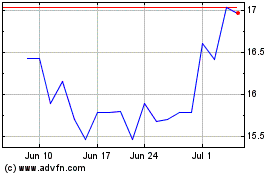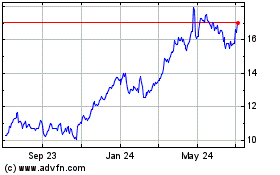By Julie Steinberg and Ben Dummett
LONDON -- The decline of Deutsche Bank AG and other former
European financial powerhouses has left a gaping hole in European
banking. U.S. banks are filling the void, strengthening their
stranglehold on the region.
Deutsche Bank's announcement Sunday that it would cut 18,000
jobs and shut its global equities sales-and-trading business is the
latest sign of how European banks are struggling. As Europe's banks
have retreated, U.S. banks are dominating.
More than halfway through the year, American banks such as
Morgan Stanley and Goldman Sachs Group Inc. have racked up the
highest revenues from advising on deals and arranging stock sales
and bond issues in Europe. Such is their dominance that so far this
year the top five banks in Europe by investment-banking revenue are
all U.S. banks, according to data provider Dealogic. Only one
European bank has made the top five spots annually between 2014 and
2018, the data show.
"It's a very depressing picture if you're a European bank," said
Martin Armstrong, chairman of Armstrong International, a
London-based executive search firm that advises banks on strategy
and head count. "They're being killed by a thousand cuts."
The woes of Europe's banks run deep. Some institutions, such as
Deutsche Bank, weren't aggressive enough after the financial crisis
in cutting bloated and risky operations. Slow growth and negative
interest rates have undermined their core profitability, causing
them to trail behind their American peers.
"They're at a competitive disadvantage," said a senior banker at
a U.S. firm in Europe.
Political paralysis in Brussels has left the business of
reforming the banking system unfinished. There is no eurozone-wide
deposit insurance and banks can't easily move capital from one
country to another.
Brexit looms over the scene as well. Banks have spent heavily to
move operations from London in preparation of the U.K.'s departure
from the European Union. No EU financial center, such as Frankfurt,
Paris or Amsterdam, has emerged as the clear winner.
As well as Deutsche Bank's huge restructuring, banks including
Société Générale SA and Dutch bank ING Groep NV are cutting in
their investment banks. HSBC Holdings PLC is laying off several
hundred people across its investment-banking and
transaction-banking units and hiring in other parts of those
businesses, said a person familiar with the matter. UBS Group AG
and Credit Suisse Group AG have scaled back their investment banks
and beefed up their wealth-management businesses, which earn steady
fees.
U.S. banks, meanwhile, have a healthier home market to support
their international ambitions. They enjoy positive interest rates
and decent economic growth. Unlike in Europe, U.S. banks were
mostly cleansed of toxic assets soon after the financial crisis.
Initial public offerings in the U.S. can yield fees of 6% to 7%,
for example, compared with between 2.5% and 3.5% in Europe. Such
income has allowed U.S. banks to plow resources into their
operations globally.
When Danish logistics company DSV A/S earlier this year sought
to acquire Swiss rival Panalpina Welttransport Holding AG, it
tapped JPMorgan Chase & Co. to advise on the $4.8 billion
deal.
One advantage U.S. banks have in such deals is scale, according
to DSV Chief Financial Officer Jens Lund. They have an edge because
their larger franchise allows them access to information from
different markets to present to clients, he said. That stands in
contrast to European banks, which are more regional in nature, he
added.
In the case of Panalpina, Mr. Lund said JPMorgan provided
crucial information on the openness of the target company's key
shareholders to a potential deal. That helped prompt DSV to launch
its bid after years of eyeing the takeover target.
That scale is also helping Bank of America Corp. and Goldman
Sachs defend Metro AG against an unsolicited bid from EP Global
Commerce. They are using their global networks to survey Metro
shareholders' view of the offer in Russia, Asia and elsewhere as
part of their work, according to a person familiar with the
matter.
About 17 U.S. banks have advised on the 10 largest announced
deals involving a European company as of early July, according to
Dealogic, compared with nine European banks. Those figures don't
include Deutsche Bank's failed attempt to merge with Commerzbank
AG. In that case, Deutsche Bank used Citigroup Inc. as its sole
external adviser.
European banks are still suffering the fallout from the global
financial crisis, having lagged behind in cleaning up their balance
sheets. Under new banking rules that will be implemented in the
coming years, European banks will have to address issues U.S. banks
have already dealt with, such as updating internal modeling and
reducing the size of their balance sheets.
U.S. banks have increased their share of investment-banking fees
as European banks have lost theirs. From a recent high of 64% in
2010, European banks now account for about 55% of market share for
fees, accordingto Dealogic. U.S. banks, which brought in 28% of the
fees in 2010, now hold 39% of the market.
U.S. banks have managed to pick up business even while reducing
their staff in Europe. Between 2014 and 2018, the largest U.S.
investment banks by revenue shed 5.2% of their workforce across
investment banking and stock and bond trading in Europe, the Middle
East and Africa, according to research firm Coalition. But that's
nearly half the rate of the largest European investment banks over
the same period.
More recently, European banks shed 2% of their staff in the same
areas from the first quarter of 2018 through the first quarter of
this year, while U.S. banks sliced 0.5%. In some instances,
however, the U.S. banks are hiring. Bank of America is in the
process of adding 50 senior investment bankers globally, some of
whom will be in Europe, according to another person familiar with
the matter.
Falling deal volumes have worsened the outlook. Many companies
are reluctant to pursue deals right now due to concerns over the
EU's growth prospects, the trade war between the U.S. and China and
Brexit.
European banks, however, are still strong in areas such as trade
finance, cash management and other corporate services, said James
Davis, a partner in consulting firm Oliver Wyman's banking
practice. And while calls for consolidation have grown louder in
recent months, it isn't clear which banks would easily be absorbed
by others.
Deutsche Bank's attempts to combine with rival Commerzbank
earlier in the year were abandoned after the two sides couldn't
come to terms on a host of thorny cultural and regulatory
issues.
"It's inevitable that Europe will need and continue to have
banks that are playing at the top table," said Mr. Davis. "It's a
question of how many and which ones."
Write to Julie Steinberg at julie.steinberg@wsj.com and Ben
Dummett at ben.dummett@wsj.com
(END) Dow Jones Newswires
July 08, 2019 12:48 ET (16:48 GMT)
Copyright (c) 2019 Dow Jones & Company, Inc.
Deutsche Bank Aktiengese... (NYSE:DB)
Historical Stock Chart
From Mar 2024 to Apr 2024

Deutsche Bank Aktiengese... (NYSE:DB)
Historical Stock Chart
From Apr 2023 to Apr 2024
